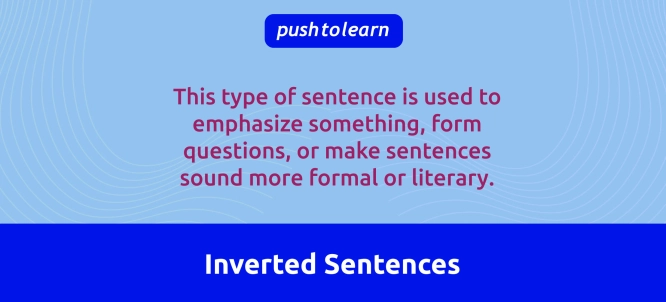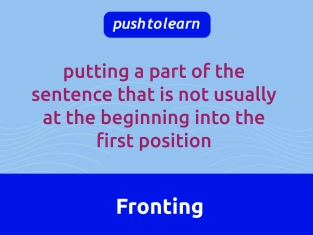by PushtoLearn
Inverted Sentences
Table of Contents
Inverted Sentences – Exercises
These exercises focus on Inverted Sentences
What is an Inverted Sentence?
In an inverted sentence, the verb comes before the subject. This is different from regular English word order. This type of sentence is used to emphasize something, form questions, or make sentences sound more formal or literary.
Examples:
-
Regular sentence: The cat sat on the mat.
-
Inverted sentence: On the mat sat the cat.
When Do We Use Inverted Sentences?
1. For Questions
In English questions, the subject and the verb are inverted.
Examples:
-
Regular: You are coming to the party.
-
Inverted (Question): Are you coming to the party?
-
Regular: She can speak French.
-
Inverted (Question): Can she speak French?
2. After Certain Adverbs or Adverbial Phrases
Adverbs like never, seldom, rarely, and adverbial phrases like not only... but also or under no circumstances often require inversion to emphasize the sentence.
Examples:
-
Regular: I have never seen such a beautiful sunset.
-
Inverted: Never have I seen such a beautiful sunset.
-
Regular: He not only works hard but also helps others.
-
Inverted: Not only does he work hard, but he also helps others.
3. For Conditional Sentences Without "If"
In formal writing, if is sometimes omitted in conditional sentences, and inversion is used instead.
Examples:
-
Regular: If I had known, I would have helped.
-
Inverted: Had I known, I would have helped.
-
Regular: If she were here, she would explain.
-
Inverted: Were she here, she would explain.
4. For Emphasis or Formal Style
Inverted sentences are used in literature or formal writing to create a dramatic or poetic effect.
Examples:
-
Regular: A bird was perched on the branch.
-
Inverted: Perched on the branch was a bird.
-
Regular: The stars shine brightly in the sky.
-
Inverted: Brightly in the sky shine the stars.

How to Form an Inverted Sentence
Step 1: Identify the Subject and Verb
Find the normal subject and verb in the sentence.
-
Example: She is coming.
Step 2: Switch the Order
Move the verb before the subject.
-
Inverted: Is she coming?
Common Errors with Inverted Sentences
1. Forgetting Auxiliary Verbs in Questions
Error: Speaks she French?
Correction: Does she speak French?
2. Using Normal Order After Adverbs Requiring Inversion
Error: Never I have seen such beauty.
Correction: Never have I seen such beauty.
3. Confusing Formal Inversion with Everyday Usage
Error: Were I at home, I watched TV.
Correction: Were I at home, I would watch TV.
Everyday Uses of Inverted Sentences
Questions:
-
Does he play soccer?
-
Can you help me?
Emphasis with Adverbs:
-
Rarely do we see such dedication.
-
Under no circumstances should you open that door.
Conditional Sentences:
-
Should you need help, let me know.
-
Were he younger, he would travel the world.
Practice with Inverted Sentences
Rewrite these sentences using inversion:
-
If I had known earlier, I would have called you.
-
She seldom watches TV.
-
A cat was hiding under the bed.
Answers:
-
Had I known earlier, I would have called you.
-
Seldom does she watch TV.
-
Under the bed was hiding a cat.
You may also find useful learning about additional ways to emphasize parts of a sentence - fronting or cleft sentences.
FAQ About Inverted Sentences
What is an inverted sentence?
It is a sentence where the verb comes before the subject, often for emphasis, forming questions, or in formal writing.
How is inversion used in questions?
In questions, auxiliary verbs (like do, does, did, is, are) are placed before the subject:
-
Regular: She likes coffee.
-
Question: Does she like coffee?
What adverbs trigger inversion?
Adverbs like never, seldom, rarely, hardly, not only, and under no circumstances trigger inversion.
Can inversion be used in conditional sentences?
Yes, inversion is common in formal conditional sentences without "if":
-
Regular: If I had money, I would travel.
-
Inverted: Had I money, I would travel.
Is inversion common in daily conversation?
Inversion is mostly used in questions in everyday conversation. Other forms of inversion (e.g., with adverbs or conditionals) are more common in writing or formal speech.

